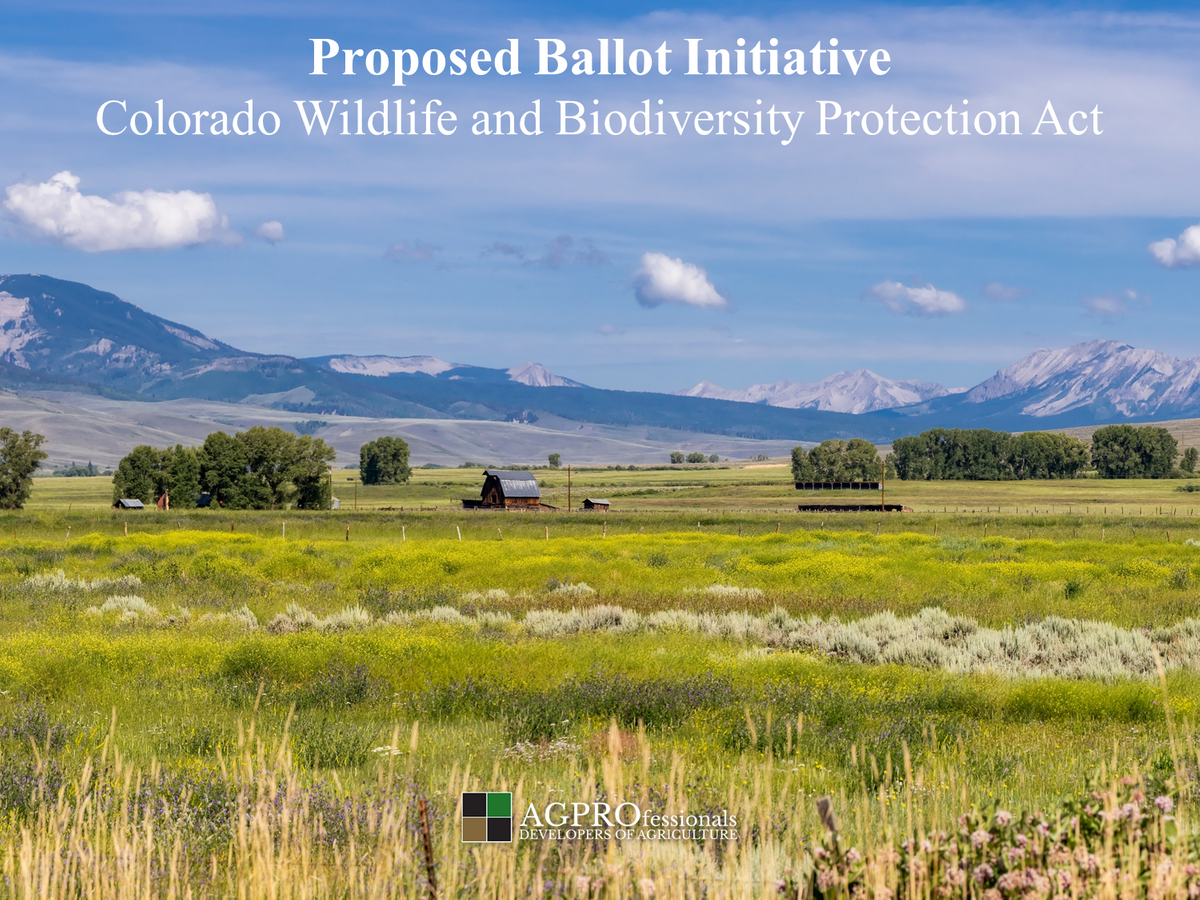The Colorado Wildlife and Biodiversity Protection Act: What Colorado Landowners Need to Know
On April 18, 2025, a new proposal was submitted for the Colorado 2026 ballot that could have significant implications for farmers, ranchers, and rural landowners across the state. Known as the Colorado Wildlife and Biodiversity Protection Act (Proposal #2025-2026 #82), this measure sounds conservation-minded at first glance but poses serious risks to private property rights, agricultural operations, and rural development.
At AGPROfessionals Real Estate, we believe it’s crucial for Colorado's agricultural community and landowners to understand what’s at stake.
A New Bureaucracy Without Accountability
The proposed Act would establish the Wildlife and Ecosystem Conservation Commission (WECC), an unelected body wielding sweeping regulatory and enforcement authority. None of its nine members would be elected; they would be appointed by universities, environmental groups, and policy organizations — with a strict prohibition against financial ties to agriculture, energy, or development industries.
In other words, the very people who work the land would be barred from having a voice on a commission that will oversee and regulate land use in Colorado.
The WECC would have broad powers, including:
- Conducting property inspections
- Issuing subpoenas
- Referring cases to the Attorney General for prosecution
If existing agencies like Colorado Parks and Wildlife (CPW) are defunded or dismantled, WECC would assume their roles.
Wildlife Corridors: Hidden Controls on Land Use
One of the Act’s most concerning elements is the creation of a statewide Wildlife Corridor Network. Although framed as "voluntary," enrolling your land comes with tight strings attached:
- Approval of conservation plans for continued agricultural activities
- Annual compliance inspections
- Loss of benefits if standards are not met
- Ongoing, unilateral rule changes affecting land use
In short, participating landowners risk losing control over everyday operations, grazing, fencing, and land management decisions to an ideologically driven commission.
Infrastructure Development at Risk
Infrastructure projects, including roads, pipelines, transmission lines, and private developments, would face new layers of environmental red tape if located near these corridors. Requirements would include:
- Wildlife overpasses and underpasses
- Extensive buffer zones
- Approval of costly mitigation plans
Even if a project is locally approved, WECC would have the authority to override local governments. This could significantly delay, increase the cost of, or outright halt needed development in rural communities.
A Self-Funding, Self-Perpetuating Bureaucracy
The proposed Act is financially structured to incentivize aggressive enforcement:
- 20% of collected fines would fund WECC’s operations
- 30% would fund land acquisitions, pulling more land out of private hands
- Developers would face impact fees starting at 0.5% of project costs, payable before construction begins
WECC would also have the authority to increase fines and fees at its discretion, using vague standards like "ecological severity."
Opening the Door to Radical Agendas
The Act would allow WECC to form "public-private partnerships" with nonprofit organizations, many of which promote rewilding, predator reintroduction, and anti-agriculture ideologies. These groups could receive funding and regulatory influence, even control over private lands, without direct voter approval.
Why It Matters for Colorado Landowners
The Colorado Wildlife and Biodiversity Protection Act represents more than just a conservation measure. It signals a dramatic shift in how land in Colorado could be managed, away from the people who live and work there, and toward unelected, ideologically motivated organizations.
At AGPROfessionals Real Estate, we are committed to standing with our agricultural clients and rural communities. As trusted advisors in agricultural real estate, we encourage all Colorado landowners, ranchers, and farmers to stay informed about this and other upcoming ballot initiatives.
For more insights, property listings, and expert guidance on agricultural real estate in Colorado, visit AGPROfessionals Real Estate.
Links:
Read the listing and track progress on the Colorado State website HERE
Language for the proposed ballot initiative - Colorado 2025-2026 #82 HERE
AGPROfessionals Consulting article HERE

